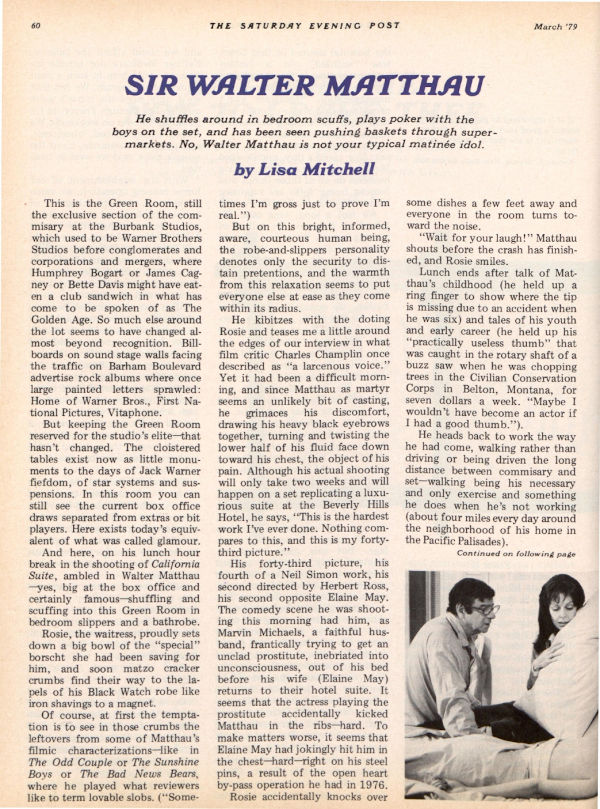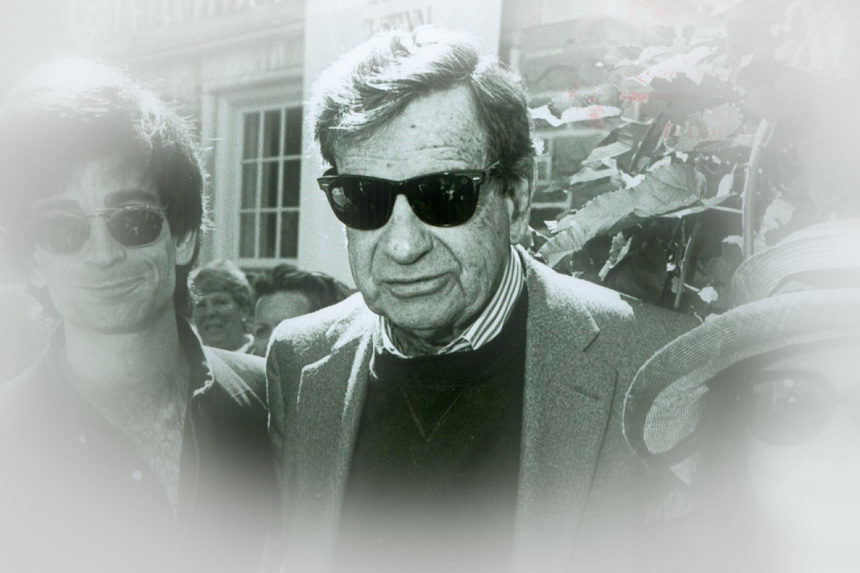In 1967, when Walter Matthau approached the stage at the Santa Monica Civic Auditorium to receive an Oscar for playing the wily lawyer “Whiplash Willie” in Billy Wilder’s The Fortune Cookie, his left arm was in a cast and sling and his face was covered with scabs. “You had a tough time getting here!” Shelley Winters quipped as she handed over his statuette.
“The other day, as I was falling off my bicycle, I had the following thoughts … ” Matthau began, as though he was about to tell a long joke. “I was given a very juicy part. I was allowed to work with talented, exhilarating, and beautiful people. I was given a good deal of money and a great deal of joy, and now, really, don’t you think this is going too far?”
In interviews, the actor had a way of turning his own experiences into hilarious punchlines. Sometimes, the anecdotes he passed off weren’t his own experiences at all, but rather complete fabrications about his past. That was the case in 1966 when Current Biography printed that Matthau’s father “Melas Matuschanskayasky” had been a Catholic priest in Imperial Russia who was banished to Finland when his “preaching of papal supremacy ran him afoul of the Orthodox authorities there.” In reality, Matthau’s father had been a poor Jewish immigrant from Kiev, and — contrary to his New York Times interview with Judy Stone in 1968 — the movie star did not list his middle name as “Foghorn” on his Social Security paperwork.
Perhaps Matthau’s desire to turn his life into a comedy derived from his intense dedication to the art of performance. (“You study the character by living with him … Even when you’re sleeping, you’re developing the character.”) Or maybe it was because his own upbringing was a classic tale of Depression-era hardship.
After his father left, Matthau was raised by his seamstress mother in a host of tenements — they were evicted often — in the slums of the Lower East Side. “All that Walter had was struggle,” his mother Rose told TV Guide in 1963. He sold sodas in some Yiddish theaters, though, and soon enough he began performing small roles in their productions. After high school, Matthau worked for the Civilian Conservation Corps in Montana, chopping trees for one dollar a day. Through the Works Progress Administration, he tried to get work in theater, but wound up coaching basketball and boxing. Then he enlisted in the Army Air Corps during World War II, serving alongside then-famous James Stewart. “I was reading about fascism,” he told the Times, “and I thought the least I could do was get in and try to kill a few bad guys. It was the least any Jew could do.”
When he returned, Matthau used the G.I. bill to put himself into acting school. He had also developed a gambling habit that would haunt him for the rest of his life. When asked about this lifelong penchant, he would often brush it off as a quirk. Why did he do it? “I wish to hell I knew!” he said in 1971. In 1979, he told this magazine that his wife Carol had expressed misgivings over his gambling in her own way: “You’re asking Fate if Fate loves you. It’s a big question to ask, and you ask it a lot.”
Matthau made his way as an actor on the stage, getting Broadway roles in the ’50s. He won a Tony in 1962 for his performance in A Shot in the Dark, and in 1965 he took on his famous role: Oscar Madison in Neil Simon’s The Odd Couple.
Though he had done plenty of television and films, Matthau did not become a famous actor — or rather a “movie star” — until he was in his 40s. His unique range and likeability provided him with plenty of roles late in life, though. He played romantic leads, villains, grumps, spies, sex icons, shysters, and everything in-between. Matthau’s frequent team-ups with other Hollywood heavyweights like Jack Lemmon, Neil Simon, and Billy Wilder made him a consistent box-office success for decades.
Writing in 1979 in the Post, Lisa Mitchell posited that “given his theater and television background, the laudations of his peers, the acceptance by the general public, Walter Matthau well may be such a national acting treasure that if this were England, he probably would have been knighted.”
Unless you’ve held on to your VHS collection, it will take some legwork to indulge in Matthau’s oeuvre thoroughly. Many of his best films aren’t available to stream online anywhere (The Fortune Cookie (1966), Kotch (1971), Pete ’n’ Tillie (1972)).
His only directorial effort, however, is available to watch on Amazon Prime. Though it would be a stretch to call it an underrated masterpiece, Gangster Story is a little-known, curious mixture of violent crime story, romance, and black comedy with a swinging soundtrack.
In a memorable early scene, Matthau’s character Jack robs a bank by prepping police officers outside, telling them that he is a film director shooting a bank robbery scene. He even gives them dialogue! It seems like exactly the kind of madcap, far-fetched fib that Matthau would have used if he were to rob a bank in real life.

Featured image: Canadian Film Centre on Flickr, cropped, CC by 2.0
Become a Saturday Evening Post member and enjoy unlimited access. Subscribe now



